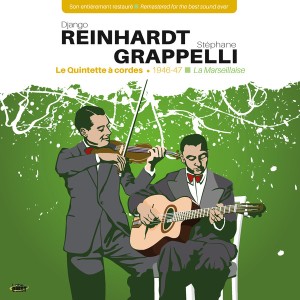
Rediscover the quintessence of this work through this series of vinyls, benefiting from exceptional sound quality thanks to the remastering work carried out.
Six years have passed since the outbreak of war in 1939. Six years during which Django and Stéphane were unable to play together, the violinist having remained in London. At the end of the world war, the idea of reforming the famous String Quintet naturally came to mind. So the two friends met up again in London - where Stéphane had now taken up residence - at the end of January 1946. As the Quintet's regular accompanists were unable to obtain their visas in time, an English rhythm section was called in for the sessions on 31 January and 1 February 1946. It brought flexibility and lightness to the music of the two virtuosos.
In the Abbey Road studios, Charles Delaunay tried to recreate the magic of Django and Stéphane's reunion. Two days earlier, the national anthem had sprung spontaneously from their fingers, in a moment of immediate communion. So they recorded this unforgettable version of La Marseillaise (Échos de France), which was unfortunately banned from the French airwaves for too many years! The programme was completed by Django's new compositions, which had emerged during the war years: Mélodie au crépuscule, Belleville and, of course, Nuages, which the violinist and guitarist recorded together for the first time.
The following year, the Quintet reformed in Paris, this time with Joseph Reinhardt and Eugènes Vées on guitars (Django's brother and first cousin respectively) and Fred Ermelin on double bass. On 21 November 1947, during a session for Radio Diffusion Française, the group's cohesion was at its peak, captured on the spot with a rare sonic presence. It was a state of grace that R-Vingt-Six, a recent creation by the two acolytes performed on this occasion, illustrates magnificently.